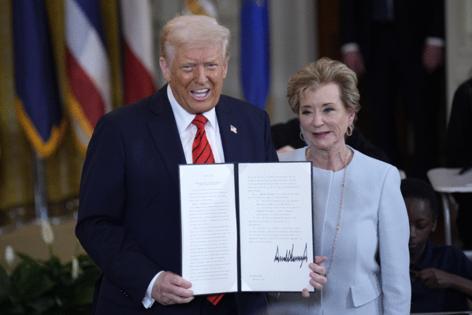TRIO cuts emerge as Education budget sticking point
Published in News & Features
WASHINGTON — Senators from both parties challenged Education Secretary Linda McMahon about her agency’s detailed fiscal 2026 budget proposal Tuesday, with a focus on cuts to the bipartisan federal TRIO programs.
Senate Appropriations Chair Susan Collins, R-Maine, who co-chairs the TRIO Caucus, said at a Labor-HHS-Education Appropriations Subcommittee hearing that she “strongly disagree(s)” with the proposal to cut the collection of federal outreach student services programs aimed at supporting low-income and first-generation students in attaining higher education opportunities.
“From my experience in Maine, I have seen the lives of countless first-generation and low-income students, not only in Maine, but across the country, who will often face barriers to accessing a college education, changed by the TRIO program,” Collins said while sporting a pin supporting TRIO.
McMahon, the first Cabinet member to appear before Congress since the Friday release of additional Trump administration budget details, said the goal of her proposal is “to make education better, fairer and more accountable by ending federal overreach and empowering families, schools and states who best know the needs of their students.”
Under the proposal, overall department discretionary spending would be slashed by $12 billion, to $66.7 billion. That would mark a 15% decrease from fiscal 2025.
The budget proposal would eliminate all of the nearly $1.2 billion in funding for the TRIO programs. McMahon said one of her concerns stems from the Education Department’s ability to understand the impact of TRIO programs and ensure accountability.
“While I absolutely agree that there is some effectiveness of the programs, in many circumstances, these programs were negotiated at very tough terms, in that the Department of Education has no ability to go in and look at the accountability of TRIO programs,” McMahon said. “It specifically eliminates our ability to do that.”
McMahon added that if appropriators decide to continue TRIO programs, they should renegotiate those terms.
Collins emphasized her priority is “to reform and strengthen those programs, fix what’s wrong, increase accountability, not abolish them.”
Subcommittee Chair Shelley Moore Capito, R-W.Va., also threw her support behind TRIO programs, saying they have been “particularly useful” in her state, given its population of first-time college students.
“I would encourage that we look at this again, and we certainly will as a committee, because all of us have this issue within our states in terms of that first-time college-goer or student that really needs the extra push, the camaraderie, the community,” she said.
Further cuts
The department’s budget request asks Congress to codify staffing cuts from earlier this year and consolidate a number of federal K-12 grant programs into one that gives more discretion to states. It would also drastically slash funding for the Institute of Education Sciences, among other changes.
The request describes the cuts as reflecting “an agency that is responsibly winding down,” though McMahon has repeatedly acknowledged that it would take congressional action to fully eliminate the department.
However, Democrats have been critical of the cuts to the agency, with a focus on the push to eliminate TRIO programs and Gaining Early Awareness and Readiness for Undergraduate Programs (GEAR UP), as well as a proposed $1,685 decrease in the maximum Pell Grant award for 2026-27.
Subcommittee ranking member Tammy Baldwin, D-Wis., said the effort to wind down the Education Department is an attempt “to score political points, regardless of the impact on tens of millions of students.”
Baldwin also raised concerns about the potential for the Department of Education to impound congressionally appropriated funds.
“I’m deeply concerned that you are planning to ignore (congressional appropriations) and will attempt to illegally impound funds and dismantle the Department of Education,” Baldwin said. “It will ultimately be students who will pay the price. But if the executive branch is allowed to do that and ignore the laws we pass, I’m not sure what we’re doing here.”
McMahon in May went before a House Appropriations subcommittee to defend the Trump administration’s so-called “skinny” budget request. At the time, TRIO cuts also received bipartisan pushback.
Sen. Jack Reed, D-R.I., said the proposed consolidation and cuts to K-12 programs are “shrinking educational opportunity in the United States for a whole generation or more, and also shrinking our ability to compete internationally and globally.”
McMahon, for her part, said the approach will result in more responsible spending.
Charter schools
The department’s budget request also proposes an expansion of charter school grants by $60 million, to $500 million total. Charter school expansion has long been a goal of many Republicans, and Sen. Katie Britt, R-Ala., praised that funding increase.
“I am a public school kid, and I am really proud, and I want to make sure that where we have children who are trapped in a failing school, that they have an option and an opportunity and a pathway forward,” Britt said.
©2025 CQ-Roll Call, Inc., All Rights Reserved. Visit cqrollcall.com. Distributed by Tribune Content Agency, LLC.







Comments